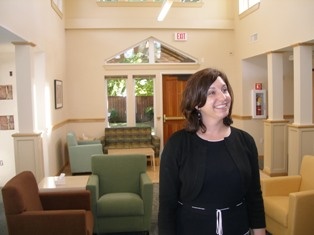 Director Martha Strawn Morris Director Martha Strawn Morris |
In an unassuming building, the new Gateway Center for Domestic Violence sits nestled inside the Gateway Children's campus in East Portland. Off the MAX blue line at 102nd and Burnside Street, the yellow building will be a one-stop shop for women and men who feel unsafe in their relationships.
The center will have an official grand opening party at 1 p.m. on Sept. 8 with several lawmakers, city officials and other advocates, including Renee Mitchell, in attendance. The center is located at 10305 E. Burnside.
Based on the Family Justice Center model that first started in San Diego, Portland's center will be the first domestic violence shelter to have a publicly listed address in Portland and will be able to perform some duties of the courthouse remotely. They will also offer support groups; spiritual support; help with divorce; custody and civil legal assistance; help filing criminal charges; and crisis and safety planning, among others.
By this fall, victims will have the ability lodge uncontested restraining orders from the comfort of the center instead of traveling to the downtown courthouse. The center is equipped with a video conferencing center linked directly to downtown.
Formerly a drop-off center for children new to the foster care system, the building underwent major renovations to make it ready for its opening, says Martha Strawn Morris, the center's director. Overnight rooms were converted into offices; garages were converted into play areas; and whole new rooms for interviews were built.
And perhaps the biggest change is the security. Taking no chances, the center's front entrance is protected by a remote lock from inside. Once a person enters, the anteroom is visible by an intake specialist and a security guard from the Multnomah County Sheriff's Office, similar to those stationed at the library.
Protected by bullet-proof glass and walls, there are also two police officers trained in handling domestic violence cases in the next building on the campus, ready to lend a hand if an abuser shows up or to take a police report on a crime.
Morris says victims will be asked to fill out a short questionnaire that will attempt to find out why a participant – as the center refers to people seeking services – has come to the center.
What Domestic Violence Can Look Like:• Verbal name calling;• You can't go anywhere without permission; • All money you make is taken and controlled by the other partner; • Your partner's anger scares you when you argue; • All your immigration documents and/or ID are hidden from you; • You're forced to have sex or watch sex that makes you uncomfortable or unsafe; • Your partner promised to never hit you again, so you stayed; • Your partner slams doors, throws things and breaks things during arguments. |
"We're really open to 'you don't know why you're here, you just want to check out our services," Morris said.
Currently, the questionnaires are in five languages and most, if not all, of the staff are multilingual. Inside the center, a "navigator" for the center will guide participants to find out what level of service they require. The center will be home to six contracted service providers, all with different areas of specialization, five of whom are culturally specific.
As a center with no overnight shelter capabilities, Morris hopes victims and others who are feeling unsafe in their relationships will utilize the center's resources before they are in crisis mode.
"I hope with enough head start and enough time in the day we can find better options," she said. "My partners who run shelters scramble for money every day. I do think though if you want to stop crisis and safety being an issue, there has to be some prevention work going on. We're also going to be doing interventions here, so our job is not just prevention here, but we sure have a better chance at doing prevention here than the shelters do. If we can keep people from getting downstream to the shelter, I've alleviated pressure on a shelter."
Morris says the service providers here will do a lot of safety planning with participants. There will also be free access to long-distance phone calls, food and child care provided at the center.
Much of the center's layout is provided for the safety, comfort and service of participants. The offices have low-walled cubicles and easy line of sight access when different service providers need to enlist the help of others in the office. There are a number of private rooms for anyone to use for a confidential interview and other open spaces to spend time.
For more information about the center, please call 503-988-6400. The center is currently open from 9 a.m. to 4 p.m., but will not be accepting service calls on the day of the grand opening.














































































































































































































































































































